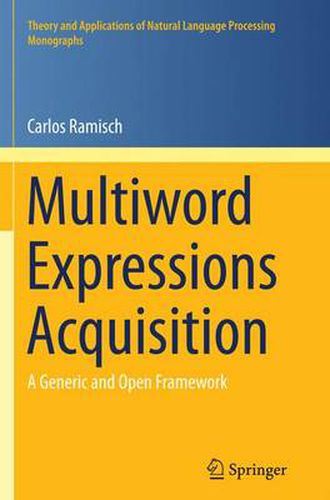Readings Newsletter
Become a Readings Member to make your shopping experience even easier.
Sign in or sign up for free!
You’re not far away from qualifying for FREE standard shipping within Australia
You’ve qualified for FREE standard shipping within Australia
The cart is loading…






This title is printed to order. This book may have been self-published. If so, we cannot guarantee the quality of the content. In the main most books will have gone through the editing process however some may not. We therefore suggest that you be aware of this before ordering this book. If in doubt check either the author or publisher’s details as we are unable to accept any returns unless they are faulty. Please contact us if you have any questions.
This book is an excellent introduction to multiword expressions. It provides a unique, comprehensive and up-to-date overview of this exciting topic in computational linguistics. The first part describes the diversity and richness of multiword expressions, including many examples in several languages. These constructions are not only complex and arbitrary, but also much more frequent than one would guess, making them a real nightmare for natural language processing applications.
The second part introduces a new generic framework for automatic acquisition of multiword expressions from texts. Furthermore, it describes the accompanying free software tool, the mwetoolkit, which comes in handy when looking for expressions in texts (regardless of the language). Evaluation is greatly emphasized, underlining the fact that results depend on parameters like corpus size, language, MWE type, etc. The last part contains solid experimental results and evaluates the mwetoolkit, demonstrating its usefulness for computer-assisted lexicography and machine translation.
This is the first book to cover the whole pipeline of multiword expression acquisition in a single volume. It is addresses the needs of students and researchers in computational and theoretical linguistics, cognitive sciences, artificial intelligence and computer science. Its good balance between computational and linguistic views make it the perfect starting point for anyone interested in multiword expressions, language and text processing in general.
$9.00 standard shipping within Australia
FREE standard shipping within Australia for orders over $100.00
Express & International shipping calculated at checkout
This title is printed to order. This book may have been self-published. If so, we cannot guarantee the quality of the content. In the main most books will have gone through the editing process however some may not. We therefore suggest that you be aware of this before ordering this book. If in doubt check either the author or publisher’s details as we are unable to accept any returns unless they are faulty. Please contact us if you have any questions.
This book is an excellent introduction to multiword expressions. It provides a unique, comprehensive and up-to-date overview of this exciting topic in computational linguistics. The first part describes the diversity and richness of multiword expressions, including many examples in several languages. These constructions are not only complex and arbitrary, but also much more frequent than one would guess, making them a real nightmare for natural language processing applications.
The second part introduces a new generic framework for automatic acquisition of multiword expressions from texts. Furthermore, it describes the accompanying free software tool, the mwetoolkit, which comes in handy when looking for expressions in texts (regardless of the language). Evaluation is greatly emphasized, underlining the fact that results depend on parameters like corpus size, language, MWE type, etc. The last part contains solid experimental results and evaluates the mwetoolkit, demonstrating its usefulness for computer-assisted lexicography and machine translation.
This is the first book to cover the whole pipeline of multiword expression acquisition in a single volume. It is addresses the needs of students and researchers in computational and theoretical linguistics, cognitive sciences, artificial intelligence and computer science. Its good balance between computational and linguistic views make it the perfect starting point for anyone interested in multiword expressions, language and text processing in general.